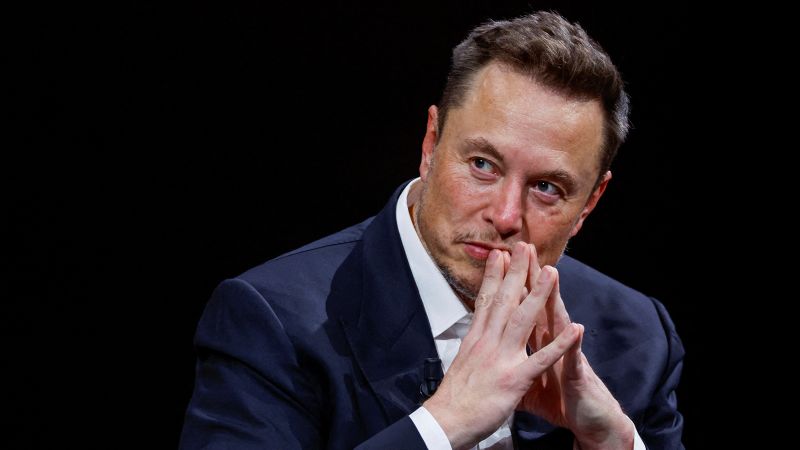New York
CNN
—
At the start of last year, Meta CEO Mark Zuckerberg was in the hot seat.
Revelations from hundreds of internal company documents, known as the Facebook Papers, had drawn sharp criticism from lawmakers, users and civil society groups in late 2021 and forced company executives to appear before Congress. Zuckerberg’s plan to rebrand Facebook as Meta and pivot to the so-called metaverse was met with broad skepticism. And the company’s core ad business was under significant pressure from privacy changes made by Apple.
But then, the attention of lawmakers, media and the tech world writ large abruptly shifted to another tech billionaire: Elon Musk.
Musk early last year criticized Twitter, then nearly joined its board, then agreed to buy the company before launching a monthslong and ultimately unsuccessful fight to get out of the deal. The saga, which only continued after Musk completed the deal and pushed through numerous controversial changes, often dominated news cycles. In the process, it seemed to make Twitter’s rivals look better managed and draw away critical attention that might otherwise have been focused on other tech giants, including Meta, as they went through painful layoffs and suffered declines on Wall Street.
This week, however, Zuckerberg notched his biggest win from Musk yet. After years of trying and failing to capture Twitter’s audience with copycat features, Zuckerberg is now capitalizing on Twitter’s struggles with a new app called Threads. Meta’s Twitter clone launched this week to unprecedented success, despite Meta’s history of privacy violations and enabling election meddling, not to mention longstanding concerns that the company and Zuckerberg wield too much power over the social media market.
The app’s overnight success was a direct result of the chaos under Musk’s leadership of Twitter since last October. During that time, he has managed to anger many of the platform’s users and advertisers with his erratic statements, mass layoffs and significant changes to Twitter’s policies. While Twitter users have lamented what Musk’s ownership has meant for the platform, it may be the best thing that could have happened for Zuckerberg.
“Musk has done one thing after another to piss off his own user base,” said Herbert Hovenkamp, a professor at the University of Pennsylvania’s Carey Law School.
Some early Threads users even commented on the strange nature of the situation — that they would be eager to join a social network run by one billionaire whose company has faced intense public criticism simply because they were so eager to get away from another.
“It boggles the mind,” one user posted to Threads. “I boycotted Facebook years ago and when I heard about this I joined immediately.”
“Never used [Facebook] nor [Instagram],” another user said, adding that they had to join Instagram for the first time to gain access to Threads. “Last thing I would have EVER expected was to use any platform of Zuckerberg’s.”
And yet, by Friday, Zuckerberg said Threads had reached 70 million user signups — amassing a user base nearly a third of the size of Twitter’s in fewer than two days for a platform that could eventually help knock out one of Facebook’s chief rivals and give a boost to Meta’s struggling ad business.
If Musk is a boon to Zuckerberg’s fortunes, he’s an unlikely one. Zuckerberg and Musk have often been at odds over the years.
In 2018, in the wake of Facebook’s Cambridge Analytica scandal, Musk said he had deleted the Facebook pages for his companies Tesla and SpaceX because the platform “gives me the willies.” And later that year, he also deleted his Instagram account.
More recently, Musk has claimed that Instagram “makes people depressed” and appeared to imply that Meta was complicit in the January 6, 2021, attack on the US Capitol.
Zuckerberg has also thrown jabs at Musk, including after a SpaceX explosion accidentally blew up a satellite that was being used by Facebook, and in a critique of his stance on artificial intelligence during a 2017 Facebook Live broadcast.
But earlier this year, Zuckerberg also complimented Musk’s leadership of Twitter. In a podcast interview last month, Zuckerberg said that “Elon led a push early on to make Twitter a lot leaner … I think that those were generally good changes.”
In some ways, Musk’s moves at Twitter may have given Zuckerberg and Meta — as well as other tech companies — cover to take similar actions without as much criticism. Meta announced it would eliminate more than 20,000 employees over two rounds of layoffs, marking the largest cuts in its history. But Meta came off looking responsible compared to Twitter’s mass layoffs by handling the cuts professionally and providing more robust severance.
After Musk restored the account of former President Donald Trump following a two-year suspension that began after the January 6 attack, Twitter faced criticism from civil society civic? groups who called on advertisers to boycott the platform. But Meta, along with YouTube, followed suit several months later (although those platforms cited their own risk analyses, rather than Musk’s leadership, in explaining their decisions).
The distraction and chaos of Musk’s Twitter takeover could hardly have come at a better time for Zuckerberg and Meta.
The social media giant’s business had a brutal year — posting its first-ever quarterly revenue decline as a public company during the June quarter, and then again in each of the two remaining quarters of the year, as it struggled with a weak online advertising market while pouring billions into its plan for the metaverse. The company lost more than $600 billion in market value during 2022.
Now, the launch of Threads marks a huge new opportunity for Meta and Zuckerberg. Threads could be a way of getting social media users to spend even more time on Meta’s apps, especially as Facebook increasingly struggles with the perception of being a has-been platform that’s less attractive to younger users.
Zuckerberg said on Wednesday that he hopes to eventually have more than one billion users on Threads, far more than the 238 million active users on Twitter prior to Musk’s takeover.
Although there are no ads on the platform yet, Threads could also ultimately supplement Meta’s core advertising business. Instagram head Adam Mosseri, who oversaw the Threads launch, told The Verge in an interview about the new platform this week that, “if we make something that lots of people love and keep using, we will, I’m sure, monetize it” through advertising.
For Musk, losing Twitter users, or having its future growth hamstrung, thanks to Threads, could mean further harm to the $44 billion investment he made to buy the social media platform — and, perhaps more importantly, to his reputation as a genius with a knack for turning around troubled companies.
Musk appears to be trying to push back against Zuckerberg’s turn of fortune. On Wednesday, a lawyer for Musk sent a letter to Meta threatening to sue the company over the rival app, accusing it of trade secret theft through the hiring of former Twitter employees. (Meta denied the charge.)
The Twitter-Threads battle has raised the stakes for another fight: a cage fight that Musk and Zuckerberg have spent the past several weeks planning. Zuckerberg, a regular practitioner of Brazilian jiu jitsu, appears to have the upper hand.
But whether or not the fight ends up going forward, Zuckerberg seems to have already won.

































